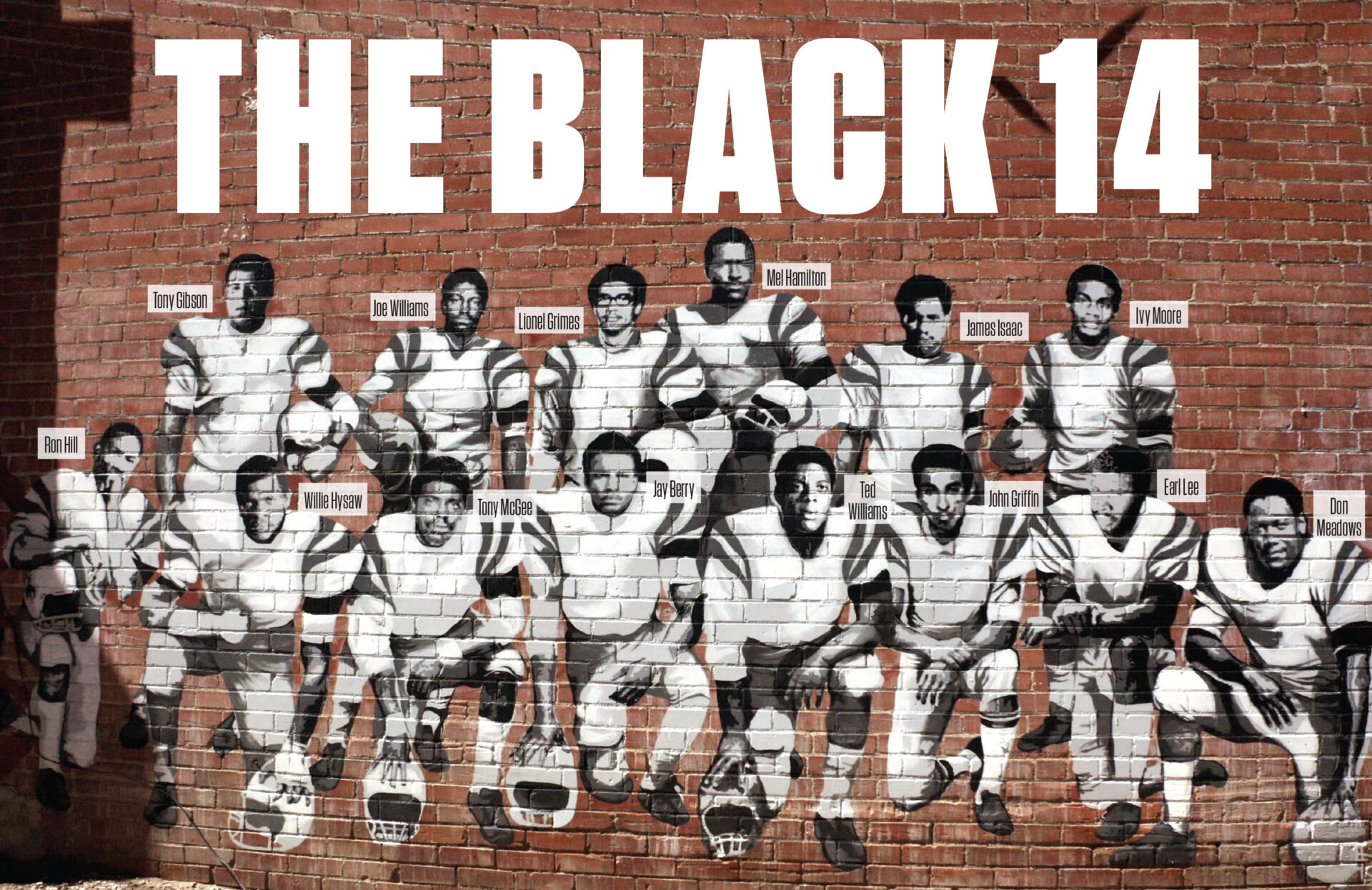
In 2019, John Griffin, Mel Hamilton, Tony McGee, Tony Gibson and several teammates were welcomed back to the University of Wyoming, 50 years after an incident that dramatically changed their lives.
These men — a few of those known as the Black 14 — committed to turn a dramatic negative experience into a meaningful positive legacy.
In 1969, 14 Black players on the University of Wyoming football team wanted to wear black armbands as a protest against the BYU football team and The Church of Jesus Christ of Latter-day Saints. At that time, Blacks could not hold the priesthood in the Church.
On the morning of Friday, Oct. 17, 1969, the 14 players appeared in the office of Coach Lloyd Eaton on the Wyoming campus in Laramie to request permission to wear the armbands in the next day’s game against BYU. At the time, Wyoming was a national power in football and was ranked No. 12 in the country. The 14 players wanted to show solidarity with their fellow University of Wyoming students who were engaged in civil-rights activities.
Eaton, though, immediately dismissed the 14 players from the team. Their dismissal was upheld that evening in an emergency session of the University of Wyoming Board of Trustees meeting with the state’s governor. Several of the players sat in the stands in the next day to watch the game, which Wyoming won, 40–7. The dismissal of the Black 14 not only impacted their lives — many were forced to withdraw from school due to loss of their scholarships, and returned to their hometowns across the United States — but it also signaled the end of Wyoming football’s sustained success. The team lost its last four games in 1969, finished with a 1–9 record in 1970 and Eaton was not invited back to coach in 1971.
Although some of the Black 14 returned to the University of Wyoming, and even to the football team, the legacy of the dismissals for many years was a mixed one. The incident was followed by positive change in some respects. BYU recruited its first Black football player in 1970. The Church began ordaining Blacks to the priesthood in 1978. But it wasn’t until 2019 that members of the Black 14 received an apology from the University of Wyoming. Not long after, several of them began working with the Church on food drives and other service and humanitarian initiatives, thereby creating a legacy of reconciliation and mutual aid.
Griffin became a ski instructor and corporate executive in Colorado, and now lives in the Denver area. Hamilton graduated from the University of Wyoming and spent years as a public school teacher and administrator in Casper. McGee played in the National Football League and then hosted a sports TV show in Washington, D.C. Gibson worked as a lineman for a power company in Massachusetts.
All of them now coordinate service with various food banks and social-service agencies in their hometowns.
Students and staff from the BYU journalism program interviewed Griffin, McGee, Hamilton and Gibson in their hometowns in Spring Term 2022, leading to this special issue of the Daily Universe Magazine. Additionally, BYU journalism students produced a video documentary about the Black 14’s service work with the Church, and the video is scheduled to premiere the week of the BYU-Wyoming football game in Provo on Sept. 24.
The Black 14
Jay “Jerry” Berry. #21, Safety. Tulsa, Oklahoma native. Retired after a career as a television sports reporter and anchor in Tulsa, Houston, Chicago and Detroit.
Tony Gibson. #44, Fullback. From Tulsa, Oklahoma. Retired in 2011 after 38 years as a lineman for a Massachusetts utility.
John Griffin. #22, Split end. Born in San Fernando, California. Was voted back on the Wyoming football team and graduated. Held several leadership positions with The Brand Company and United Airlines.
Lionel Grimes. #23, Defensive back. Born in Alliance, Ohio. Worked for Ford Motor Company and later as an employment diversity executive at Toyota.
Mel Hamilton. #65, Offensive guard, Tackle. Born in Boys Town, Nebraska. Graduated from the University of Wyoming. Hamilton became the first Black principal in Wyoming.
Ron Hill. #81, Split end. Born in Denver, Colorado. Became a physical education teacher in Denver.
Guillermo “Willie” Hysaw. #20, Flanker. Born in Bakersfield, California. Started his career in employment diversity and went on to become a vice president of Lexus Japan.
James Isaac (deceased). #30, Halfback. Born in Hanna, Wyoming, Graduated from Dakota Wesleyan University in Mitchell, South Dakota. Died Dec. 25, 1976.
Earl Lee (deceased). #66, Offensive guard. Born in Chattanooga, Tennessee. Retired as a principal, football coach and biology teacher in Baltimore, Maryland. Died Jan. 13, 2013.
Tony McGee. #88, Defensive end. Born in Battle Creek, Michigan. Played in the NFL for 14 seasons capping his career in Washington. McGee hosts a sports talk show.
Don Meadows (deceased). #52, Middle guard. Born in Denver, Colorado. Returned to play football at Wyoming. Died Nov. 10, 2009.
Ivie Moore. #33, Defensive back. Born in Pine Bluffs, Arkansas. Worked as a floor subcontractor in Arkansas.
Joe Williams. #26, Tailback. Born in Lufkin, Texas. Played briefly in NFL. Williams owns a property management company in Dallas.
Ted Williams. #24, Tailback. Born in Port Hueneme, California. Foreman at a paint manufacturing company in Waukegan, Illinois and top bowler.




